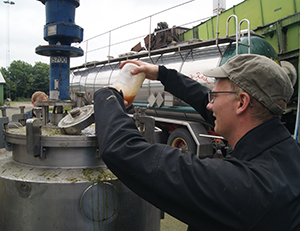Great potential in biorefined protein from clover grass
A new system for extraction of high value feed protein by biorefining techniques approved for organic production is developed and tested in the OrganoFinery project. A full scale test has shown promising results indicating possibilities for better provision of organic protein and increased organic production. Both an assessment of the feed value and further technical development has to be completed before a commercial production can be established.

The market for organic food is increasing significantly with expected growth rates in Denmark for organic pork, eggs and chicken between 10-40 % p.a. This cause an urgent need for organically produced protein feed especially after 2017 where a deviation permit to use 5 % conventionally produced protein will expire.
In the OrganoFinery project, a new way of producing organic protein has been developed and tested. The method is based on protein refining of green biomass as for example clover grass or other legumes. Fresh clover grass harvested at the same stage as for cattle feed is pressed in a big screw press, producing juice and pulp (press cake).
The juice is fermented with lactic acid bacteria to a pH of 4 causing precipitation of the soluble proteins. Thereafter the proteins are separated and concentrated from the juice in a separator and eventually dried. The residual press cake from the screw press can be used as cattle feed as it contains fiber-bound proteins, or for the production of biogas.
Earlier studies have shown that it is possible to produce 3.4 ton of protein concentrate per ha per year with 25 % DM and 46 % raw protein in the dry matter. That is approximately 400 kg raw protein per ha.
It has been shown, that the amino acid profile in clover grass protein is comparable to soy protein with an even higher level of methionine, and it is therefore expected to be very valuable as feed for poultry, pigs and cattle. Furthermore the protein concentrate contains lactic acid from the fermentation which is found to be beneficial for the animals.
During the summer 2016, an area of 60 ha of organic clover grass has been processed in a temporary full scale setup in cooperation with the organic farm Sønderhøjgård I/S, Nybro Tørreri and KMC (see illustrations). The Bio-Value project also participated for the evaluation of the press cake and the protein concentrate as cattle feed.
This full scale production has demonstrated that it is possible to run a continuous process with crop harvest, juice pressing, fermentation, transportation and extraction of the protein concentrate, and simultaneously making silage of the press cake.
Next steps
The next step in the projects will be to assess the feed value of the protein concentrate and of the press cake. In the OrganoFinery project it will be tested on laying hens and in the Bio-Value project on dairy cows.
These preliminary positive experiences support the expectation that extraction of proteins from e.g. clover grass can establish a new production line in organic farming, where poultry, pig and arable farms grow clover grass for protein production. This is expected to improve crop yields and increase the provision of organic feed protein for poultry and pig production, thereby supporting the growth of organic production satisfying the growing demand for organic food.
Great interest at innovation workshop
An innovation workshop jointly held by the OrganoFinery and Multiplant projects in May 2016 showed a promising interest among farmers and contractors for this production system. It is therefore likely that further investments in the system can make it operational on a commercial scale.
The project is coordinated by ICROFS and part of The Organic Research, Development and Demonstration Programme Organic RDD 2, supported by GUDP under The Danish Ministry of Environment and Food.
Visit the project website of OrganoFinery
Photo 1: Full scale test plant with Vincent screw press.
Photo 2: The screw press is separating the clover grass into juice and press cake.

